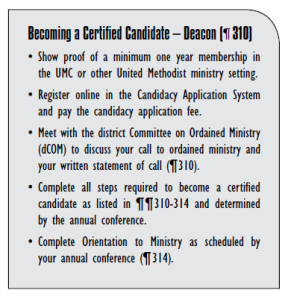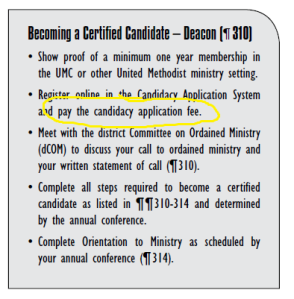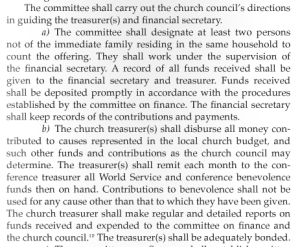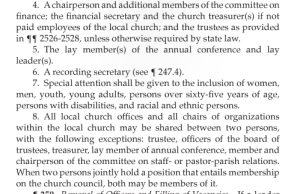What follows is the text of an e-mail I am sending momentarily to the Secretary of the General Conference and the resident bishop of the San Antonio episcopal area.
Secretary Reist and Bishop Dorff,
There are two problems concerning General Conference delegates from the Rio Texas Annual Conference that I am not aware of having been addressed.
I. How many General Conference delegates will Rio Texas be allocated?
II. When will these delegates be elected?
I.
According to ¶¶ 511.5 and 2012 General Conference Calendar Item 238, the Commission on the General Conference determines the General Conference delegate allotment for each annual conference. The most recent allotment I’ve seen does not contain an allotment for the new Rio Texas Annual Conference.
This blog post on the website of the South Central Jurisdiction states, “When ACs unite the aggregate of the conferences will be the number of the new Annual Conference in 2016.” On the surface this statement sounds plausible. However, the South Central Jurisdiction does not have the disciplinary authority to make this determination. Unless this determination comes from the Commission on the General Conference pursuant to ¶¶ 15 and 511.5, such a determination is contrary to The Book of Discipline of The United Methodist Church.
Based on 2012 lay membership statistics (on the linked webpage there’s an Excel spreadsheet under “Department Resources”), the Southwest Texas Annual Conference has 114,884 lay members; the Rio Grande Annual Conference, 13,087 lay members. If Rio Texas has 10 General Conference delegates for its total of 127,971 lay members, by lay membership it would be the smallest U. S. Annual Conference with 10 delegates. It will have two more General Conference delegates than Arkansas (134,864 lay members), North Alabama (135,458 lay members), and Central Texas (166,859 lay members).
If this allotment question were up to me, I would reallocate Rio Grande’s two delegates to the new Great Plains Annual Conference. Based only on 2012 lay membership statistics the lay membership for Great Plains would be 223,009 lay members. Great Plains will be much larger than Mississippi and its 179,320 lay members, the largest current U. S. Annual Conference lay membership with 12 General Conference delegates.
Of course, this allotment question is not up to me. It is supposed to be answered by the Commission on the General Conference.
II.
It’s fundamental to the polity of The United Methodist Church that annual conferences, the basic bodies of the church (¶¶ 11, 33), elect General Conference delegates (¶¶ 13.1, 13.2, 15, 33, 34, 35, 36, 502.1a, 502.2, 502.3, 502.4, 502.5, 511.5). It follows logically that General Conference delegates from the Rio Texas Annual Conference will have to be elected by the properly constituted Rio Texas Annual Conference.
In the U. S., jurisdictional conferences set annual conferences (¶¶ 9, 27.4, 40). I would argue that once an annual conference no longer exists pursuant to constitutional procedure, the General Conference lacks the authority to recognize delegates from the nonexistent annual conference.
As far as I can tell, there are currently no plans for the Rio Texas Annual Conference to elect 2016 General Conference delegates. I conclude this because the preliminary agenda for the upcoming meetings of the Southwest Texas and Rio Grande Annual Conferences has set aside June 13th (3:15 and 4:00 respectively) for General Conference elections. I don’t question that each annual conference has the authority to do so. I just don’t see the point of holding these elections when the conferences currently plan to cease to exist by the time of the opening session of the next General Conference. Under this current plan, the next General Conference will arguably have no basis in law for seating these delegates.
Just now I first noticed the pastoral letter dated May 20, 2014. This pastoral letter provides further confirmation of the conferences’ plans to hold elections that might not be recognized by the General Conference.
III.
I might be accused of wallowing in schadenfreude. As far as I’m concerned, it would be worse for me to point out this potential problem after questionable elections.
There’s been talk of the importance of the Church setting boundaries. I don’t know what could be more fundamental in The United Methodist Church than the setting of annual conference boundaries. These boundaries are part of what define the context of “fair and open” elections. The guarantee at ¶ 13.2 of a fair and open process in selecting those who set global policy for the Church has been a cherished part of the Constitution since January 2006.
In my opinion, it is in the best interests of the Church that this situation go under judicial review. If for whatever reason judicial review does not occur, I would hope that at least one delegate would challenge the credentials of all delegates elected by annual conferences that no longer exist. Such a failure would establish dangerous precedent.
I speak for myself in this e-mail. (I’m also posting it online.) If anyone else has doubts about this situation, by speaking out maybe I can also help them speak up. Any further comments on my part will be determined by what the Southwest Texas and Rio Grande Annual Conferences do next month in Corpus Christi concerning these dubious elections.
Respectfully,
Steven B. Wiegner



